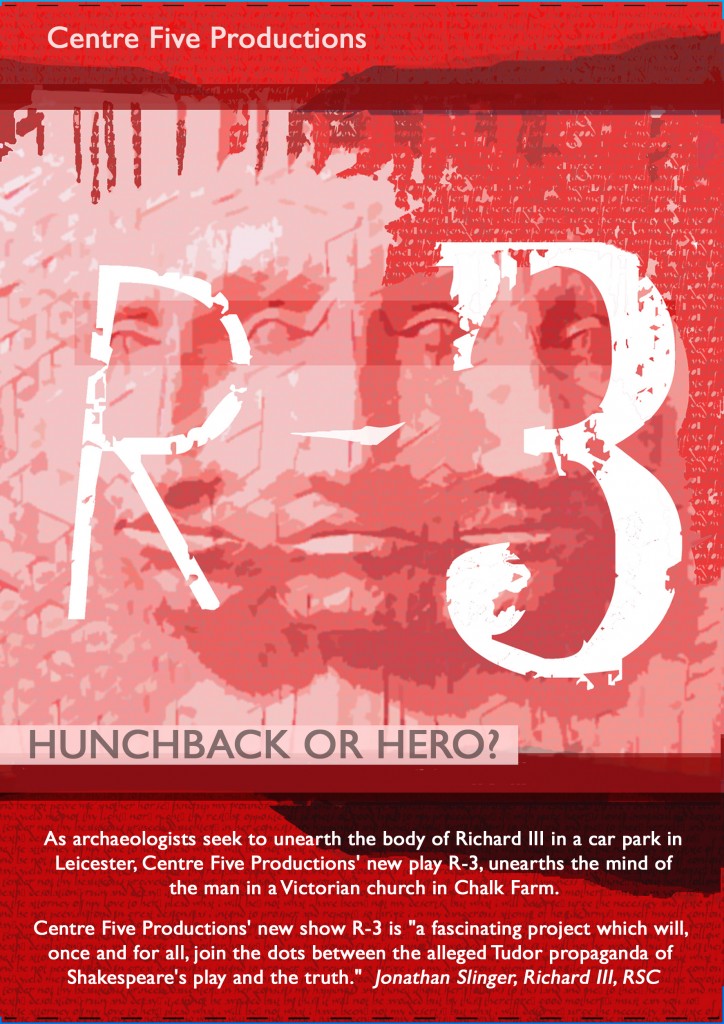“See how I am bewitch’d”: Interpreting witchcraft accusations in Shakespeare’s “Richard III’
***
King Richard’s Magic Week 2012 continues. The first post, on the significance of magic in the fifteenth century, is found here. My reading tip — if you want to plumb current scholarly understandings of what magic and witchcraft meant in the early modern context — and you’re not afraid of exposing yourself to some serious erudition — the book’s been described as “evocative and relentlessly academic” but also as “unrivalled” — I can make no more compelling recommendation than Stuart Clark’s Thinking with Demons: The Idea of Witchcraft in Early Modern Europe (1999), upon which many of my insights and arguments about the intertwining of various strands of early modern life with witchcraft are drawn. I love this book; my copy is battered and worn.
In this post, I draw on Clark’s idea that witchcraft accusations were not a pretext for political moves, but rather understood by early modern people as an intimate factor in how politics actually worked.
***
In Act III, scene iv of Shakespeare’s Richard III, in an intriguing exchange, the character of Gloucester (Richard’s title before becoming king) attributes his physical deformity to the machinations of witches — specifically, his late brother Edward’s wife and Edward’s mistress, Jane Shore. After charging that they have sought his death with their “devilish plots,” he urges:
Then be your eyes the witness of this ill:
See how I am bewitch’d; behold mine arm
Is, like a blasted sapling, wither’d up:
And this is Edward’s wife, that monstrous witch,
Consorted with that harlot strumpet Shore,
That by their witchcraft thus have marked me.
Laying aside Shakespeare’s bias against Richard, as well as the debates over the status of his physique — although the language and image of a “blasted sapling” are compelling to me — the modern reader is likely to interpret this accusation as a political or misogynistic pretext for Richard’s rapaciousness. Such a reading seems at first to be supported by Gloucester’s declaration, in subsequent lines, that if Hastings is not willing to agree to this explanation, he must be a traitor:
“If! Thou protector of this damned strumpet–
Tellest thou me of ‘ifs’? Thou art a traitor:
Off with his head!”
Gloucester appears, here, to accuse the women of witchcraft as an excuse to eliminate anyone who disagrees with his usurping power grab.
 Hastings’ intermediate line, however, tends to balance this reading with evidence of a worldview that attributed misfortunes to supernatural influences; Hastings does not say, “there are no witches,” or “witches don’t do things like that,” or even, “don’t accuse these women of being witches,” but rather, “If they have done this thing […] –” a line that explicitly concedes that witches exist who accomplish such deeds, though Gloucester cuts Hastings off, and we don’t get a “then” from him. This interpretation gains more currency when we consider that Shakespeare lacked access to Titulus Regius, the document that formulated the charge of witchcraft against Woodville and her mother — Henry VII had ordered all copies of it in English archives destroyed in order to protect his wife against the claims of illegitimacy that had justified the deposition of her younger brother, and our modern awareness of it postdates Richard III — and must have had another source, which points to a cultural willingness to associate Woodville with witchcraft. Finally, when we think about this scene in the context of political history, we note that the elimination of Hastings — who was supposed to have been in league with Elizabeth Woodville to keep her son, Edward V, on the throne, with the infamous Shore, also his mistress, as go-between for the conspirators — constituted a key step in Richard’s move toward the throne. But Hastings had made important sacrifices for the York family in the past, going into exile with Edward and Richard, and supporting Richard’s role as Lord Protector against the Woodvilles. In light of these political circumstances, of which the playwright was certainly aware, I suggest that Shakespeare does not have Gloucester accuse the women of witchcraft in order to present him as scheming to achieve his ends. Rather, Gloucester’s accusation in the play reflects his conviction that if something is troubling in his body or his political circumstances, then there must be an explanation — witches.
Hastings’ intermediate line, however, tends to balance this reading with evidence of a worldview that attributed misfortunes to supernatural influences; Hastings does not say, “there are no witches,” or “witches don’t do things like that,” or even, “don’t accuse these women of being witches,” but rather, “If they have done this thing […] –” a line that explicitly concedes that witches exist who accomplish such deeds, though Gloucester cuts Hastings off, and we don’t get a “then” from him. This interpretation gains more currency when we consider that Shakespeare lacked access to Titulus Regius, the document that formulated the charge of witchcraft against Woodville and her mother — Henry VII had ordered all copies of it in English archives destroyed in order to protect his wife against the claims of illegitimacy that had justified the deposition of her younger brother, and our modern awareness of it postdates Richard III — and must have had another source, which points to a cultural willingness to associate Woodville with witchcraft. Finally, when we think about this scene in the context of political history, we note that the elimination of Hastings — who was supposed to have been in league with Elizabeth Woodville to keep her son, Edward V, on the throne, with the infamous Shore, also his mistress, as go-between for the conspirators — constituted a key step in Richard’s move toward the throne. But Hastings had made important sacrifices for the York family in the past, going into exile with Edward and Richard, and supporting Richard’s role as Lord Protector against the Woodvilles. In light of these political circumstances, of which the playwright was certainly aware, I suggest that Shakespeare does not have Gloucester accuse the women of witchcraft in order to present him as scheming to achieve his ends. Rather, Gloucester’s accusation in the play reflects his conviction that if something is troubling in his body or his political circumstances, then there must be an explanation — witches.
 Applying Clark to Shakespeare generates the following possible reading: One of the most common perversions associated with sorcery in the period was the distortion of love — and Richard should have loved Hastings. And yet he does not — which suggests something larger in the world of the play is amiss. While it’s clear that Shakespeare doesn’t much like Gloucester, this scene suggests that Gloucester is not so much evil because he lies — rather, he lies because everything around him, from his body to his ambitions, is permeated with demonic influences. In response, Richard, who reveals here that he’s quite conscious of this state of affairs, does not react against the influence of witches, but indeed cooperates with it. Richard, for Shakespeare, is thus much more than simply a usurper and a schemer — his usurpation and schemes are symptomatic of a political world gone wrong under the influence of supernatural forces.
Applying Clark to Shakespeare generates the following possible reading: One of the most common perversions associated with sorcery in the period was the distortion of love — and Richard should have loved Hastings. And yet he does not — which suggests something larger in the world of the play is amiss. While it’s clear that Shakespeare doesn’t much like Gloucester, this scene suggests that Gloucester is not so much evil because he lies — rather, he lies because everything around him, from his body to his ambitions, is permeated with demonic influences. In response, Richard, who reveals here that he’s quite conscious of this state of affairs, does not react against the influence of witches, but indeed cooperates with it. Richard, for Shakespeare, is thus much more than simply a usurper and a schemer — his usurpation and schemes are symptomatic of a political world gone wrong under the influence of supernatural forces.
***
Could he have reacted against demonic influence? Had Richard’s political and personal ends been fouled by witchcraft, could he have done anything about it? Yes, indeed — he could have. Seeing as how this is getting long, again, however, I’ll go to that theme in my next post, which will concern recommended fifteenth-century remedies against witchcraft.
Leicester Fought and Won…?
♛ Leicester News ♛
News is breaking that Leicester has won the ‘New Battle in the Wars of the Roses’ and was able to decide the (premature) skirmish for their Cathedral.
The Ministry of Justice seems to have made the final decision now, in case the human remains turn out to be King Richard III, to bury him in the Cathedral of Leicester, in which proximity, he already rested for over 500 years.
- King Richard III to get cathedral burial…after his skeleton was found under the car park 500 years after his death – Daily Mail (28.10.2012)
- Richard III dig: Leicester Cathedral burial confirmed – BBC News (29.10.2012)
♛ Further Leicester News ♛
- Hold your horses over King Richard III’s remains, warns archeologist – Is the euphoria about finding King Richard III premature? – This is Leicestershire (27.10.2012)
- House of Commons row over Richard III’s resting place – The York Press (27.10.2012)
- David Mitchell’s Soapbox: Richard III – Video about a ‘curious’ alternative to give King Richard III a state funeral, as soon as it is decided where to bury him. (Hopefully not necessary any longer, now that the decision is made for Leicester). – The Guardian (25.10.2012)
Was Richard III really threatened by witchcraft?
***
***
 On October 31, the northern hemisphere of Planet Earth finds itself halfway between autumnal equinox and winter solstice. In this week of the solar year, depending on our relationship to various western traditions, the supernatural and the related proximity of our own world to the souls of the dead may touch lightly or rest heavily on our minds. Celebrations and commemorations include Samhain, Halloween, All Saints’ / All Hallows, All Souls’, Día de los muertos, and probably a few more I’m not aware of. While contemporary commercialism amplifies our awareness of some of these holidays, at the same time, they have been associated with the themes of religion, magic, and witchcraft at least since the Celts. This week on King Richard Armitage, we’ll take a combination of historical, cultural, literary, fanciful and humorous approaches to the connections between Richard III and the supernatural realm.
On October 31, the northern hemisphere of Planet Earth finds itself halfway between autumnal equinox and winter solstice. In this week of the solar year, depending on our relationship to various western traditions, the supernatural and the related proximity of our own world to the souls of the dead may touch lightly or rest heavily on our minds. Celebrations and commemorations include Samhain, Halloween, All Saints’ / All Hallows, All Souls’, Día de los muertos, and probably a few more I’m not aware of. While contemporary commercialism amplifies our awareness of some of these holidays, at the same time, they have been associated with the themes of religion, magic, and witchcraft at least since the Celts. This week on King Richard Armitage, we’ll take a combination of historical, cultural, literary, fanciful and humorous approaches to the connections between Richard III and the supernatural realm.
***
***
Common wisdom discounts the preoccupation of the late medieval and early modern worlds with supernatural matters as the product of deficient knowledge. People acquainted with science, the story goes, reject magic. Most current professional historical scholarship rejects that view, pointing out the persistence of the irrational in contemporary life, but however we feel about their reasons, Richard III and his contemporaries lived in a world permeated with supernatural influences and occurrences. In that world, the miracle of the Eucharist — in which the communion host was transubstantiated by the words and actions of a priest into the actual, physical body of Jesus Christ — counterposed the manifestations of the Devil seen all around in disease, crop failures, and misfortunes great and small. The learned magician and the untutored witch or cunning woman acted as counterparts to the priest in offering people a chance to interact actively with the supernatural. Spells, charms, potions, and amulets as well as sacraments, rituals, and sacramentals offered technologies not only for explaining their circumstances, but influencing them.
 Because most of us no longer believe in magic or witchcraft, we may tend to read their regular appearance in the political dramas of English history as pretext. On this view, people accused enemies of witchcraft in order to eliminate them, which could be said to explain why Shakespeare, whose Richard III was heavily influenced by propagandists sympathetic to the Tudor monarchs, was so willing to take up stories we today find politically motivated because we can’t imagine anyone believed them. But such views are anachronistic in light of the near-total absence of religious skepticism in Europe before the mid-seventeenth century. Shakespeare, too, probably believed in witchcraft, magic, and prophecy, along with his audiences — not only the plot, but also the appeal, of Macbeth are hard to understand without such sympathies. Moreover, accusations of undue supernatural influence would have carried little political weight had they been widely seen solely as pretexts. Contemporaries did not choose between witchcraft OR politics to explain situations they did not like, but rather saw them as intertwined. Bad politics was the result of evil manipulation of the supernatural.
Because most of us no longer believe in magic or witchcraft, we may tend to read their regular appearance in the political dramas of English history as pretext. On this view, people accused enemies of witchcraft in order to eliminate them, which could be said to explain why Shakespeare, whose Richard III was heavily influenced by propagandists sympathetic to the Tudor monarchs, was so willing to take up stories we today find politically motivated because we can’t imagine anyone believed them. But such views are anachronistic in light of the near-total absence of religious skepticism in Europe before the mid-seventeenth century. Shakespeare, too, probably believed in witchcraft, magic, and prophecy, along with his audiences — not only the plot, but also the appeal, of Macbeth are hard to understand without such sympathies. Moreover, accusations of undue supernatural influence would have carried little political weight had they been widely seen solely as pretexts. Contemporaries did not choose between witchcraft OR politics to explain situations they did not like, but rather saw them as intertwined. Bad politics was the result of evil manipulation of the supernatural.
 Seen from this perspective, sorcery posed a serious threat to the English throne in the fourteenth and fifteenth centuries. Henry IV’s wife, Joan, was imprisoned at the accusation of her stepson (the future Henry V) for using witchcraft — which explained her problematic influence, as “French,” at a time when Henry V was trying to reassert claim on the throne of France. Henry VI became the object of a plot by Eleanor Cobham, Duchess of Gloucester, when her own husband became heir presumptive — she consulted astrologers who predicted illness for Henry, and purchased potions, allegedly to help it along. When Henry heard this story, he also consulted astrologers — so the maleficence here involves not the use of the supernatural, but rather the malefactor’s impulses. Underlining the absolute normality with which everyone involved acted, Eleanor’s fellow accused were a cleric / learned astronomer, her personal confessor (i.e., a priest), and her personal physician (also a beneficed cleric), along with a witch who came from the ranks of the prosperous yeomanry and frequented the Gloucester court. Everyone except the witch was highly educated and all of them were acting in ways that everyone at the time understood.
Seen from this perspective, sorcery posed a serious threat to the English throne in the fourteenth and fifteenth centuries. Henry IV’s wife, Joan, was imprisoned at the accusation of her stepson (the future Henry V) for using witchcraft — which explained her problematic influence, as “French,” at a time when Henry V was trying to reassert claim on the throne of France. Henry VI became the object of a plot by Eleanor Cobham, Duchess of Gloucester, when her own husband became heir presumptive — she consulted astrologers who predicted illness for Henry, and purchased potions, allegedly to help it along. When Henry heard this story, he also consulted astrologers — so the maleficence here involves not the use of the supernatural, but rather the malefactor’s impulses. Underlining the absolute normality with which everyone involved acted, Eleanor’s fellow accused were a cleric / learned astronomer, her personal confessor (i.e., a priest), and her personal physician (also a beneficed cleric), along with a witch who came from the ranks of the prosperous yeomanry and frequented the Gloucester court. Everyone except the witch was highly educated and all of them were acting in ways that everyone at the time understood.
 Finally, the example most likely to interest Richard III fans: Elizabeth Woodville, accused of maneuvering Edward IV into marriage by witchcraft in Titulus Regius, the parliamentary document that declared her sons illegitimate and permitted Richard to take the crown is said in this text to have achieved this result by means of witchcraft accomplished with her mother as “the publique voice and fame is thorough all this Land.” In other words, in the troubled years of Edward’s reign, when tension over favors granted to the Woodvilles promoted a factionalism threatening to the peace of the realm, which a French marriage might have prevented, everyone had already spoken of the possibility that this was the case. Elizabeth was not a villain who was accused of witchcraft to discredit her influence. Rather, the document suggests, she had engaged in witchcraft, as a consequence of which she obtained an influence over Edward that brought ruin to the country, which meant that she was a villain. Such associations would have been obvious not least because love potions were a central part of the stock in trade of witches and cunning women — sought out by people of all ranks — so that Elizabeth’s personal attractiveness to Edward could also be explained with reference to witchcraft.
Finally, the example most likely to interest Richard III fans: Elizabeth Woodville, accused of maneuvering Edward IV into marriage by witchcraft in Titulus Regius, the parliamentary document that declared her sons illegitimate and permitted Richard to take the crown is said in this text to have achieved this result by means of witchcraft accomplished with her mother as “the publique voice and fame is thorough all this Land.” In other words, in the troubled years of Edward’s reign, when tension over favors granted to the Woodvilles promoted a factionalism threatening to the peace of the realm, which a French marriage might have prevented, everyone had already spoken of the possibility that this was the case. Elizabeth was not a villain who was accused of witchcraft to discredit her influence. Rather, the document suggests, she had engaged in witchcraft, as a consequence of which she obtained an influence over Edward that brought ruin to the country, which meant that she was a villain. Such associations would have been obvious not least because love potions were a central part of the stock in trade of witches and cunning women — sought out by people of all ranks — so that Elizabeth’s personal attractiveness to Edward could also be explained with reference to witchcraft.
***
***
And yes — a Richard III film will have to deal with this complex of themes. How were the different types of the supernatural tied together in the fifteenth century? So the answer to my question — was Richard III really threatened by witchcraft? — is: Yes. Because everyone in the fifteenth century was. They knew they were; beliefs in such matters were not excuses for other, less polite sentiments, or the refuge of the uneducated — they were matters that constituted the nature of temporal life just as certainly as gravity does for us. And the people who mattered in England for the previous century.
***
***
If Richard was indeed under threat from witchcraft, the question is what he could have done about it. I’ll pick up there in a future post. I actually wanted this one to be humorous, but I got preoccupied by reading Titulus Regius. Bl–dy Internet! Now that is an interesting document. So I may go there, next. Or not. Any preferences among the readership? Anything you want to know?
Leicester Fights Back
♛ Leicester News ♛
- Keep Richard III remains in Leicester –
Petition for Leicester started by Roy Shakespeare.
You once again need to be a U.K. citizen to be able to sign this petition.
We do not have an official petition here, but in our poll you all can vote and all choices are open and all views are welcome.
Petitions for York:
The PetitionSite (worldwide)
ePetition (U.K. only) - Hinckley pensioner launches bid to keep King Richard III’s bones in Leicester – Report about the petition for Leicester in The Hinckley Times, 18.10.2012
- MP – Richard III should be buried in Worksop – MP John Mann for Bassetlaw told Parliament in the House of Commons about a new suggestion where to burry King Richard III.
Though his arguments are a bit anti-King Richard III. He once again is the murderer of his nephews, though any kind of prove and a conviction still is missing. – Trader & Guardian – Retford Today (25.10.2012) - UK lawmakers line up to host Richard III’s tomb – Times-Standard – The Associated Press (25.10.2012)
Fight about King Richard III’s remains, even before their identity is 100% confirmed.
My defence for this movement is, that before the possibilities of a mtDNA analysis, the current research resulsts already would have been deemed a reliable identification of the remains. As the laboratory research still has some imponderabilities, which can influence its reliability as well, those other factors are quite significant in themselves already. - Winter of discontent? UK lawmakers fight over Richard III’s tomb – Fox News about the new ‘War of the Roses’ (25.10.2012)
- That Richard III… is ‘e still on the electoral roll in York? – Daily Mail Online, by Quentin Letts – Would Richard III win the elections? Don’t wait for it, vote for King Richard in our film-petition! (25.10.2012)
- Bury Richard III in Leicester? York? Or… Worksop? – This is Leicestershire about the new War of the Roses and a new rose, Worksop, entering the battlefield. (26.10.2012)
- King Richard III relative visits the spot he died – Report on ITV News about Michael Ibsen, 17th generation descendant of King Richard III’s sister, visiting Bosworth, the place where King Richard III died. (26.10.2012)
- To the New War of the Roses about the last resting place for King Richard III, see also CDoart’s funny take on a new alternative “New Suggestion for King Richard III …” or why the last resting place should be in Bavaria ;o)
Review of “R-3” by Dr. Ashdown-Hill
R-3
The new Centre Five Production on Richard III, by Caroline Devlin & Timothy Allsop
On 10 October, via one of my publishers, I received an invitation to attend the opening night of R-3, a new play about Richard III, which the co-author, Caroline Devlin, told me was partly inspired by my book The Last Days of Richard III.
The venue – a rather grand Victorian gothic church at Chalk Farm – was quite a journey for me, and I arrived a little early. Sitting waiting for the play to start was, in its own way, significant. The church was dimly lit. Six tall candles were burning on the high altar, and the rood screen was wreathed in periodic puffs of smoke, which I saw as symbolic of Henry VII (whose emblem, after all, was a red dragon) still doing his best to obscure the truth about his predecessor.
The play was a one-man show, lasting about an hour. Tim Allsop, who played Richard, has taken the same role previously in Shakespeare’s dramatisation, and he had some of the same lines to say in this new play – though the meaning here was different.
Caroline and Tim’s play acknowledges the writings of Shakespeare, More, Vergil – and even Ashdown-Hill – accepting some and rejecting others (I will leave you to guess which are which). I didn’t agree with all the interpretations, but then part of the rationale of the new play is its thesis that there are now multiple ‘Richards’ and that it is sometimes hard to tell which (or whose) ‘Richard’ is the real one.
Personally I found the interpretation of Richard’s relationships with his mother and with Anne Neville moving. However I have never been able to accept the notion that Richard was a sickly child. Towards the end of the play I found myself moved, too, by Richard’s profound analysis of what it means to be a king.
The close of the play was sad. Even if Richard III’s body has now been dug up in Leicester, in one sense he is still deeply buried.
The play was enthusiastically received by the audience. If you should get the chance to see it I would strongly recommend doing so. Like me, you may not agree with everything in the new play, but it is certain to inspire both thoughts and feelings.
John Ashdown-Hill
Details and announcement of the play “R-3” in London
More information about Dr. Ashdown-Hill and his publications, which are crucial in the current search for King Richard III in Leicester.
|
The Last Days of Richard III is a new and detailed exploration of Richard’s last 150 days, based on new evidence and explores the events from the standpoint of Richard himself and his contemporaries. By deliberately avoiding the hindsight knowledge that he will lose the Battle of Bosworth Field, we discover a new Richard: More Info » |
||
|
Eleanor Talbot, the woman who put Richard III on the throne. When Edward IV died in 1483, the Yorkist succession was called into question by doubts about the legitimacy of his son, Edward (one of the ‘Princes in the Tower’). The crown therefore passed to Edward’s undoubtedly legitimate younger brother, Richard, Duke of More Info » |
||
|
The first-ever biography about John Howard with new revelations as to why he became Richard III's main supporter. In 1455 John Howard was an untitled and relatively obscure Suffolk gentleman. Thirty years later, at the time of his death at the Battle of Bosworth Field, he was Earl Marshal, Duke of Norfolk, Lord Admiral More Info » |
Is Shakespeare Altering His View of “R-3” ?
Today:
♛ R-3 Play ♛
For a long time, Shakespeare’s “Richard III” has dominated the perception of King Richard III.
Now, with modern research, we have more details about the king and can get closer to the true story. Soon the results of the mtDNA research are expected, but what does this all mean about how we see the king?
A new play by Caroline Devlin, “R-3”, is about Shakespeare’s play, but heavily influenced by the research by historian Dr. John Ashdown-Hill, who had a major influence on the research, location as well as on finding the reference person for the mtDNA comparison, Mr. Michael Ibsen.
The play asks the fundamental question about King Richard III:
Hunchback or Hero?
R-3
created by
Caroline Devlin and Timothy Allsop
(Centre Five Productions)
Running from
17 October – 3 November 2012
at St. Saviour’s Church, London
(Eton Road, NW3 4SQ,
2 min walk from Chalk Farm Tube)
Further information & reservation:
www.centrefiveproductions.co.uk
♛ Leicester News ♛
- “Richard III Leicester” is a new Facebook page with current updates and news about King Richard III by the City Council of Leicester, which is one of the participants, financiers and initiators of the archaeological research in Leicester.
- Richard III dig: Is there millions in Shakespeare’s villain? – Video report about the monetary aspect of finding a king under a carpark. – BBC News Leicester, 15.10.12
- Richard III archaeology team awarded honour for Leicester dig – Report about an award, Philippa Langley received from the Richard III Society for her wonderful work for King Richard III. (ThisIsLeicestershire.co.uk, 15.10.12)
- Many say Richard for York – The battle for King Richard III has just begun, (Leicester Mercury, ThisIsLeicestershire.co.uk, 12.10.2012)
- Possible Richard III discovery could hold success for economy of Hinckley and Bosworth – The Hinckley Times, Katy Hallam (11.10.12)
♛ Collective Reading ♛
Servetus has the leading questions to the chapters 6 – 10 of “The Sunne in Splendour” by Sharon Kay Penman and a poll for you:
Are you ready for the Richard III rumble? Week 2!
Servetus’ background information and new questions to chapter 11 – 15: Richard III / The Sunne in Splendour group read rumbles on! Week 3
Chapters 16 – 20 are on the reading list for this week and will be discussed next Sunday, October 21st, 2012.
Important Links for the read:
(Under development)
If you want to join in and still need a copy of the book, please consider to make your purchase via the link at RichardArmitageNet.com, where reference fees will go to the charities selected by Mr. Armitage. Thank you!
Amazon.co.uk – Amazon.com Print & Kindle edition
Reference fees gained through links at the KRA website also go to the RA-charities.
Thank You for 1.000 Signatures !
It is quite difficult, to find a nice ‘Thank you’ image with a white rose.
But this symbol for King Richard III is quite necessary, to celebrate this important landmark in our petition for the film version about King Richard III’s life, as Mr. Armitage intends it to do.
Especially now, as all the press and film industry becomes aware of how much support a king from over 500 years back has today, a film and more detailed visualization of the life and circumstances of this historically ill treated king is necessary. A film version is the best way, to create his story anew for recipients of today, after Shakespeare’s version for so long dominated the perception of King Richard III.
To congratulate and thank you, yes, each single one of our wonderful followers and supporters, here comes a self created picture with a white rose and the King himself.
He still looks a bit angry, though I think he is very pleased with us 1.000 signers.

Thank you for signing and supporting us so wonderfully along the way to 1.000 signatures!
So now, what are our next steps? Should we target the next 1.000 ;o)
Yes! Together we can make that happen.
We have accumulated well over 100 unconfirmed signatures of the petition once again.
To give you, who did not confirm your signature, another chance to do so, we will send out new confirmation mails tonight.
Please look out for this mail also in your junk mail-folder, as sometimes mails with links (confirmation link) get sorted out and appear there. In general this should not happen, but sometimes it could be the case.
Thank you !
Leicester News and History
♛ History of Leicester ♛
The following reading by Richard Buckley already was held on 1st of October, but now is available on YouTube. Here he expains and shows examples from the rich history of Leicester, which goes back into Roman times.
The part about King Richard III starts at about [0:55:40], but the whole video and is an interesting overview of the story of Leicester.
At the end of the video, the major of the city of Leicester, Sir Peter Soulsby, bridges the gap between history and modern times and shows the interesting perspective, what can and is intended to be done, to re-connect the modern town of Leicester with its rich history:
♛ Leicester or York? ♛
The battle continues and York is winning supporters, nationally and internationally.
See the new article about the petition, initiated by the Richard III Foundation:
- York goes global in its fight for Richard’s royal bones – by Martin Hickes (The Guardian, 09.10.2012)
♛ Collective Reading ♛
The weekly article about the next chapters 6 – 10 of “The Sunne in Splendour” by Sharon Kay Penman will follow shortly. It got delayed by some ‘real life’ events, but is under construction right now.
If you are interested in joining in the read, but don’t have the book yet, please consider bying it via RichardArmitageNet.com, where reference fees will go to the charities selected by Mr. Armitage. Thank you!
If you want more information and discussions around the work of Sharon Kay Penman, please consider the special groups on Facebook, which were brought to our attention by an Australian fan Fiona on Servetus’ blog here.
She mentions the following three groups on Facebook:
- Sharon Kay Penman Fan Club
- Australian Sharon Kay Penman Fan Club
- Justin de Quincy Fan Club
News and Petitions
♕ Petitions for York ♕
As the first petition for York only was available for British citicens or residents living in the U.K., the Richard III Foundation, Inc., as they know a lot of people from abroad are interested in King Richard III as well, has created a further online petition, which is available worldwide:
Time for King Richard III to come home to York
The PetitionSite (worldwide)
ePetition (U.K. only)
We received news, that another petition, demanding King Richard III for Leicester is intended as well, but could not get hold of a link or more details so far.
You always can vote in our poll, to determine, where your favours lie and where you think, King Richard III should be laid to rest.
♕ Leicester News ♕
- Richard III dig: Leicester Cathedral ‘obvious choice’ for burial – The Bishop of Leicester very nicely assembles points which will have to be considered in doing a ceremonial service for King Richard III interment – (BBC News, 02.10.2012)
- Richard III dig: Mayor of Leicester considers sites for a museum in the city – Would King Richard III be happy about so much attention? Did he somehow manage to get some angels on his side to let something happen after over 500 years? At least, the bid for his attention seems to start now. An own museum in Leicester sounds like a good start, to get a more balanced view of his historically blackened reputation. (This is Leicestershire, 02.10.2012)
560th Birthday of King Richard III
Happy Birthday, King Richard III

It is hard to tell, but I hope he is very content with the results of the digging in Leicester and the news coverage he, as king of over 500 years ago, could reach in modern times.
We at KRA were really raking our brains what present we could give a king to his 560th birthday.
See what Servetus came up with at her blog Me + Richard Armitage:
Trendy birthday gifts for late medieval English kings

A present, we are sure would please King Richard III, is more information about his life and easy access to it, so we chose to start with two projects to easily enable access to details about his life:

The first project is related to the currently collective reading of “The Sunne in Splendour” by Sharon Kay Penman:
Figures – Index, which is expandable into a more general reference of persons connected and in some relation to King Richard III.

The other one is a time table about events about King Richard III’s life and related events:
Chronology
Please don’t judge too harshly right now, as both works are still at the beginning and work in progress.
Help is welcome at any time!
♛ Richard III – Conference ♛
As the Richard III Foundation especially hold their annual conference in October, because it is the birthday month of King Richard III, today is a very fitting occasion, to remind of their next annual meeting, where guests and non-memebers are very welcome as well.
They hold their annual conference in Market Bosworth on Saturday, 13th of October 2012.
The program is:
- Dr. John Alban “From Ashwellthorpe to Bosworth: a Yorkist Soldier”
- Dr. Craig Taylor “Chivalry and the Wars of the Roses”
- Steve Goodchild “The Arrival: The Role of Richard, Duke of Gloucester at Twekesbury”
- Mike Ingram “The Road to Bosworth”
- Mark Downing “Military Effigies in the Yorkist Age”
- Dr. David Hipshon “The Princes: Contemporary Assumptions”
- David Baldwin “The Character of Richard III”
Registration begins at 8:30 a.m., the conference will begin at 9:00 a.m. and will conclude at 5:00 p.m.
Symposium at Market of Bosworth about “King Richard III”
(Dixie Grammar School, Market Bosworth)
2012 Conference Registration Form (pdf-file)
The day before, on Friday 12th, there is opportunity to a battlefield walk, held and explained by Mike Ingram, who has excellent knowledge about the battle, the area and the historical details. His book, “Bosworth 1485” is a real treasure full of information, background knowledge and thought provoking details.
♛ KRA News ♛
Maria Grazia at her blog Fly High posted her review about the new book by Philippa Gregory “The Kingmaker’s Daughter”, the story of Anne Neville, the later wife of King Richard III.
Read about the female perspective on history and a completely new approach to tell the story of Anne Neville and Richard III.
♛ Leicester News ♛
- Richard III dig: Leicester City Council car park site to remain open – This is Leicestershire, 27.09.2012 – The trench where King Richard III is believed to have been found, remains open for further investigations!
- Greyfriars Project: protecting the archaeology – University of Leicester, 25.09.2012 – If you delayed your visit to Leicester to see the digging trenches some time later, your chance is gone for now. The trenches are being filled to preserve them for later excavations.
- Are the remains of King Richard III causing a stir? – Interviews and report about King Richard and Leicester, by Kev Mclean, correspondent for Deutsche Welle, 30.09.2012
















